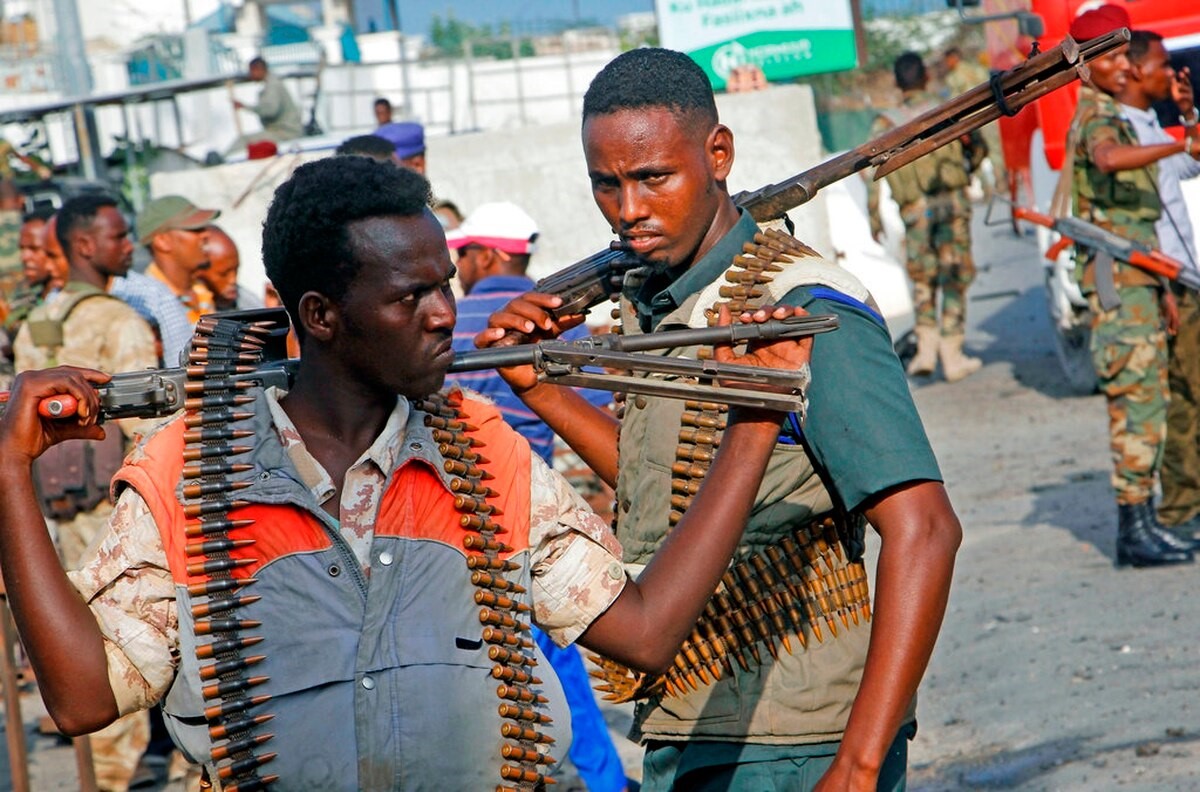
There’s more than two million people. The biggest army the world has ever seen. They do not defend their homeland, but are committed soldiers, most of whom serve in Africa south of the equator, the Middle East or as special troops on the pay of a dictator. These are not illegal immigrants, but employees of duly registered companies who pay taxes and the pension fund – for those reaching old age. They are hardened by decades of massacres, they know neither pity nor compromise. They are the image of savagery and feed on blood, money and fear.
The most impressive of these companies is called G4S Global and is based in London[1]. The owners, unknown to the public, are hidden by the holding company G4S Secure Solutions Inc. in Wilmington (Delaware, USA[2]), which is represented in 125 countries with 625,000 among political advisers, spies, soldiers, technicians and officers[3]. Obviously the mercenary of such an enterprise has a bad reputation: among other things, because he lets illegal immigrants arrested by the American police[4] work as slaves and because his cadets, in the areas around the training bases, are raping women, practicing pedophilia and are often guilty of acts of violence[5].
In the industry’s endless horror row, G4S has made a name for itself for thousands of illegal[6] eavesdropping devices; for handing over a passport, salary and weapon to former jihadist Omar Mateen, who committed a massacre (49 dead and 53 injured) at a gay bar in Orlando, Florida[7], in June 2016; for organizing, arming and military defending a riot in Birmingham Prison with the aim of allowing a seemingly special[8] escape for a single prisoner. A grim picture of impunity and inability, especially on the part of US governments, to defeat a monster they created after World War II, thus engaging many Nazis who still felt lust on murder[9].
Executive Outcomes: Stormtroopers for multinational corporations
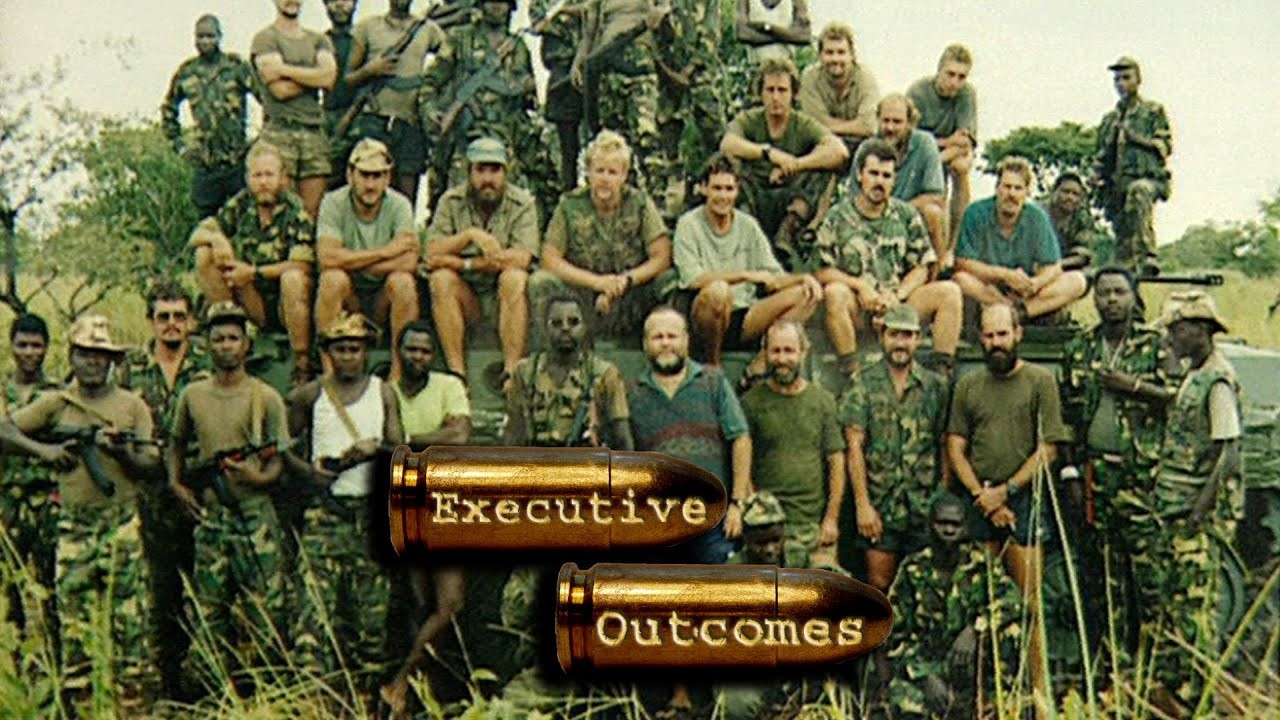
March 1993: Group photo of Executive Outcomes’ mercenaries involved in Angolan guerrilla warfare to liberate multinational oil wells[10]
Gradually, over the years, the troops that were originally controlled and led by individual states such as the Foreign Legion[11] are being privatized. Because national States were bound by international peace treaties and during the Cold War years, there is a fine balance that must not be compromised by national army deployments. Because national parliaments ask too many detailed questions about the activities of these troops and, over the years, technological escalation has skyrocketed costs. Because national armies cannot be deployed to defend certain interests without causing an international diplomatic incident and therefore cannot guarantee that they have an effective special unit that never takes into account the humane treatment of civilians in the areas operational[12].
Executive Outcomes SA Hatfield (South Africa)[13], the first big name in the privatized war, was not created by former soldiers, but at the initiative of oil groups operating in Africa, coordinated by the founder of the multinational Heritage Oil of Canada[14]. Logically, his employees are all longtime assassins with many years of experience in massacres and torture: General Manager Luther Eeben Barlow is a former Special Forces Lieutenant Colonel of the Apartheid Army who has as a background for decades of torture and repression of opponents of the regime – as well as participating in pilot uprisings in Congo, Angola, Sierra Leone and Namibia[15].
Barlow takes his longtime friends with him: his staff, consisting of Captain Michael Mullen and Captain Simon Mann, Major Lafras Luitingh (South African intelligence recruiting officer)[16], Captain Niclaas “Nick” Van den Bergh (parachute officer), Michael Grunberg (accountant and fiduciary trustee). Everything is paid for by Anthony Leslie Rowland “Tony” Buckingham, a former British Special Boat Squadron[17] officer and oil entrepreneur for several years at Sabre Petroleum[18] – a company founded by Naushad and Nurdin Jivraj, who at the time still ran a company, UAE Investment Fze Abu Dhabi[19], which was liquidated in 2011 after a series of unsuccessful international arbitrations[20].
From the start, Executive Outcomes has not only dealt with the settlement of high-ranking officers, spies and dying apartheid arms dealers[21], not with governments either, but with the leadership of companies active in the mining sector. and oil in sub-Saharan Africa – companies with big security problems because they operate in war zones and cannot be defended by the local army because this army is poorly endowed and cannot control the territory[22].
The first major order came in 1993 from Canadian Ranger Oil Ltd. Calgary (now acquired by Canadian Natural Resources Ltd. Calgary[23]), which is licensed by the Angolan government (25% of Blocks 16 and 19), pays costly bribes and is personally protected by President George Bush, who during the civil war blackmailed the MPLA of President José Eduardo Dos Santos and thus obtained oil production contracts[24]. Executive Outcomes is part of the same agreement and coordinates the forces of the MPLA[25] so that Ranger Oil, along with Heritage Oil, with which it shares its licenses, appoints Executive Outcomes to defend their assets[26].
No wonder: Heritage Oil is the oil company founded by Tony Buckingham, former partner of Executive Outcomes[27], and it is again Buckingham that allows Executive Outcomes to make the leap in quality and get another contract from the Angolan government received (paid by the state oil company Sonangol, partly directly to Heritage Oil[28]) and immediately after a contract from the government of Sierra Leone, led by the very young President Valentine Strasser, who did not have a regular army for defend the country against the RUF (Revolutionary United Front)[29] – the mercenary army, led by Liberian President Charles Taylor, partly CIA-funded, whose sole mission was to slaughter entire villages near diamond mines and to plunder the natural resources of all West Africa[30]. The contract is personally signed by Tony Buckingham and states that he will pay the costs of his mercenaries in exchange for a written promise to obtain a license to operate the diamond mines after the end of the war[31].
Tony Buckingham, oil trader and pillager
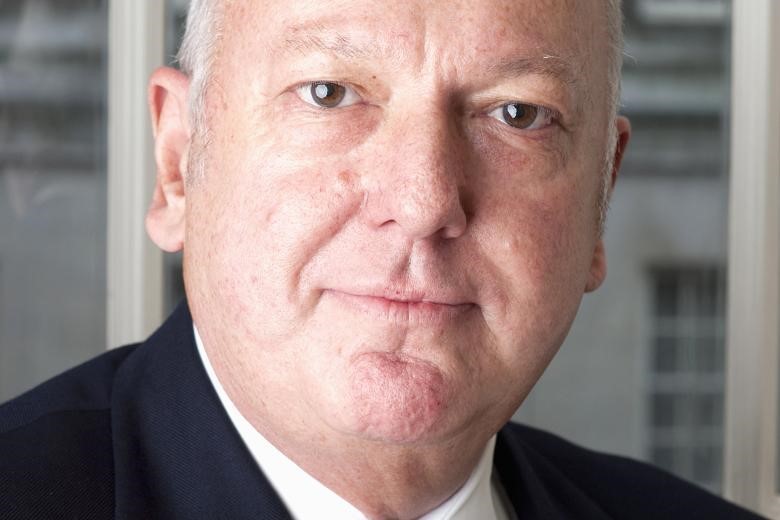
Anthony Leslie Rowland “Tony” Buckingham[32]
Even his date of birth is unknown. As he became a multimillionaire in the late 1990s and the press wanted to photograph him on his luxury yacht, English journalists received an official date from him, November 28, 1951, which later turned out to be false[33]. British journalists find out that he started working as a diver in the North Sea as a young boy and making money repairing oil rigs. He was then hired by Ranger Oil and Premium Oil, so Tony began studying as an oil trader and security service provider[34].
In the 1990s, as he worked with Executive Outcomes, he already owned Sabre Petroleum and then Branch Energy Ltd. Nassau[35], to which he brings his work and contacts. However, the money belongs to DiamondWorks Ltd. Vancouver (now Energem Resources[36]), a company whose shareholders include Simon Mann of Executive Outcomes[37]: The contracts of these two Canadian companies are suspected of having been acquired illegally (in Sierra Leone, Angola, Lesotho and Venezuela) , so that in 2000 the founders will decide to sell the company[38].
At the same time, Buckingham founded his first security company, Sandline International Ltd. London, together with Simon Mann and British Lt. Col. Tim Spicer, a Falklands War veteran who then got into trouble because of two of his soldiers: while on patrol in Belfast, they had killed an unarmed passer-by and were sentenced to life imprisonment as a result[39]. Spicer will be able to let them be pardoned and take them to Iraq[40] as a mercenaries to work for his new company, Aegis Defense Services, which is still one of the top-rated military intelligence and service companies in the world[41].
Sandline is in trouble soon: the mercenaries of Spicer and Buckingham, signed by the Prime Minister of Papua New Guinea Julius Chan, suffocate the independence movement on the island of Bougainville[42] with blood, which will lead the international community and even the Papuan army to dethrone Chan and stop Spicer[43]. The international scandal is huge and even affects British Prime Minister Tony Blair, accused of knowing and keeping silent on the nature of the contract[44]. At the same time, Sandline is accused of violating the embargo on arms deliveries to warlords who fought against each other during the civil war in Sierra Leone[45] and later in Zimbabwe and Equatorial Guinea[46].
First the NGOs, then the United Nations, and finally the justice system of various African countries who want to scan through the dark web of human trafficking now orchestrated by Executive Outcomes, now Sandline International, now DiamondWorks, and find out over and over again that this galaxy actually functions as a single industrial and commercial group. The strategy is clear: to sell weapons and military services to potential future dictators in exchange for mining and oil licenses – an offer that black African warlords, who lack sufficient financial support, cannot do without[47].
As the attention of international observers turns to these companies, the group decides to change its face. In 1993 Antonio Carlos Guedes “Tony” Teixeira, a Portuguese mercenary with a career in apartheid information payment, founded Sir Trading (Pty) Ltd. Bedfordview[48] (the district of the rich whites on the border of the parish of Johannesburg). It is a holding of more than twenty companies active in the arms trade, diamond trade, food trade, logistics, automobile trade, real estate and civil aviation[49].
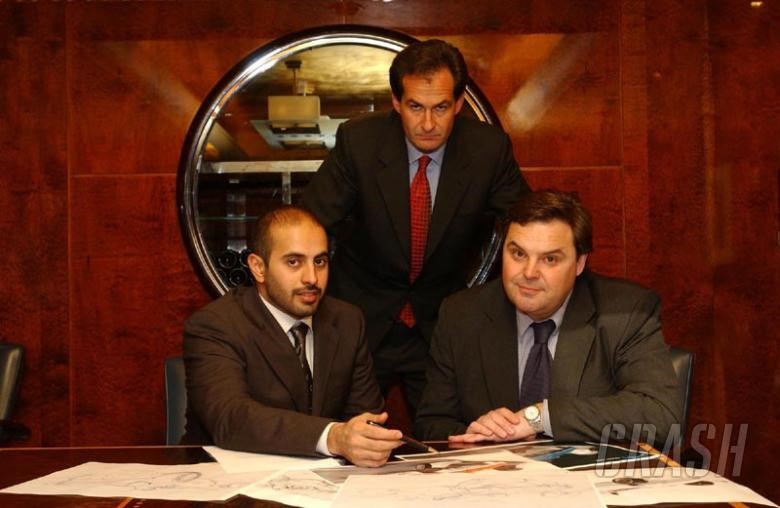
January 26, 2004: Sheikh Maktoum Hasher Maktoum Al Maktoum, Brian Menell and Antonio Teixeira sign the contracts between the Lola racing team and the A1 Grand Prix Fze Abu Dhabi[50]
In July 2002, Sir Trading acquired 12.1% of DiamondWorks and 80.1% of Otterbea International (Pty) Ltd. Bedfordview (which has been the frontline company of apartheid mercenaries since 1964) bringing together all of those who worked under one roof as partners in South African intelligence in the 1980s, resulting in premiere view the impression that DiamondWorks and its affiliates are changing the owners and the business strategy[51].
Unfortunately, the opposite is true. A few weeks later, Teixeira, through his offshore company Lyndhurst Ltd. Saint Peter Port (Guernsey)[52], acquires the absolute majority of DiamondWorks and immediately gets into trouble: UN troops catch him in a crime while he and the famous Russian arms dealer Victor Bout[53] deliver weapons to the rebels of UNITA and therefore the fourth phase of the Angolan civil war[54]. One of his managers is kidnapped and then killed by UNITA militiamen because they understand that DiamondWorks is playing a double game and also works for the MPLA[55].
The mice rush off the ship: Executive Outcomes moves to STTEP International Ltd. Gibraltar[56] (STTEP stands for Specialized Tasks, Training, Equipment & Protection International), which begins with a lucrative contract with the Nigerian government to combat the jihadist militias of Boko Haram[57]. Antonio Teixeira continues to work with DiamondWorks and moves his main activity to the United Arab Emirates[58]. Tony Buckingham moves Heritage Oil’s core business to Uganda[59] and opens a new mercenary recruiting and security company, Saracen International Ltd. Kampala.
Saracen International, Abu Dhabi and the piracy trade
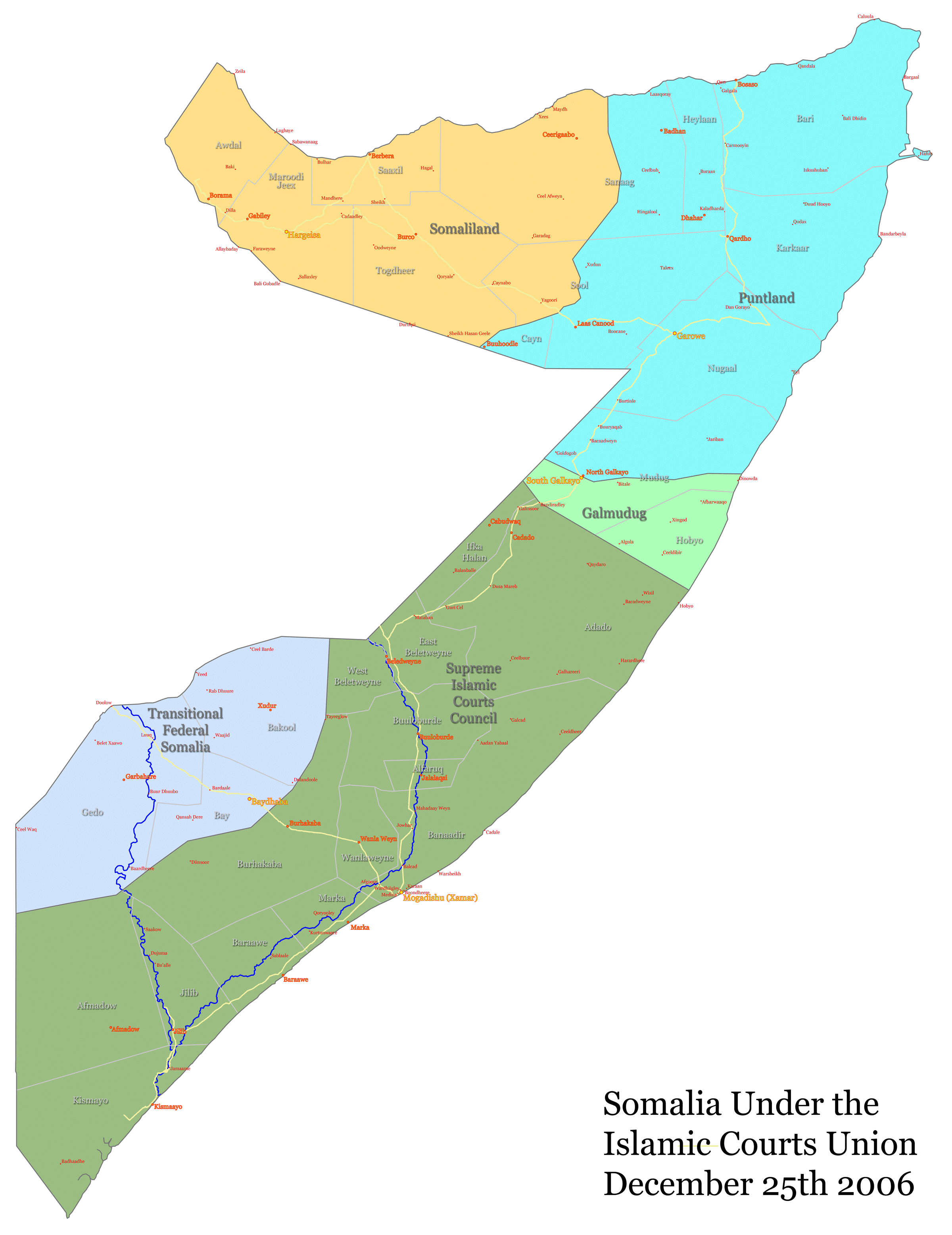
The division into five administrative zones of the former Somalia: Somaliland (orange), Puntland (light blue), Galmudug (light green), Federal Government Transition Zone (blue) and Islamic Council (dark green)[60]
Between 2008 and 2013, every ship that crossed the Gulf of Aden – a stretch of sea necessary to cross the Suez Canal and thus navigate between Europe and Asia – risked an attack by Somali pirates[61]. These fishermen for the most part who lost their reference markets after the implosion of Somalia, or former soldiers of one of the armies on the ground during the Somali civil war, choose this path to survive and, having obtained a surprisingly successful[62], efficiently organized, well-armed forces affiliated with political groups (such as al-Qaeda[63]) that could help other hackers convert ransom money for their actions into cash[64].
For the CIA and many other intelligence organizations operating in the Horn of Africa, fighting pirates is an unmissable opportunity to hire former American soldiers and the many mercenaries who fought in Iraq and Afghanistan, and had traditionally been trained in Uganda, where they also ran irregular prisons to torture jihadists captured in the field – with the difference that now in this new scene any mercenary can fight in an unofficial war, and his income is in arms, oil and investment in natural resources begins – although the United States begins has always denied having knowledge of this development[65].
Saracen International was signed as personal guardian of former President Abdulkareem Jama in March 2010, and on November 18 of this year the contract was changed: Saracen’s contractor becomes the government of Puntland through money borrowed from the United Arab Emirates[66]. As the crisis emerged, debts were reduced with the granting of licenses to ENOC Emirates National Oil Company Fze Dubai to exploit oil and gas fields discovered in Puntland[67] and could not be drilled, in 2010, because they were under the orders of the main Muslim rebel, Mohamed Said Atom, an ally of the pirates and the jihadists of Al-Shabab[68], who was in police custody.
The newborn Saracen International is also presented for the training of the armies of the various territorial administrations resulting from the implosion of Somalia and, thanks to the mediation of the authorities of the United Arab Emirates, receives a contract for the training of a force of 1,050 men specializing in the fight against pirates, which is part of the army of Puntland – one of the territorial divisions of the country which has been part of the political and military sphere of influence of Riyadh and Abu Dhabi and of China’s commercial investment sphere for more than twenty years[69].
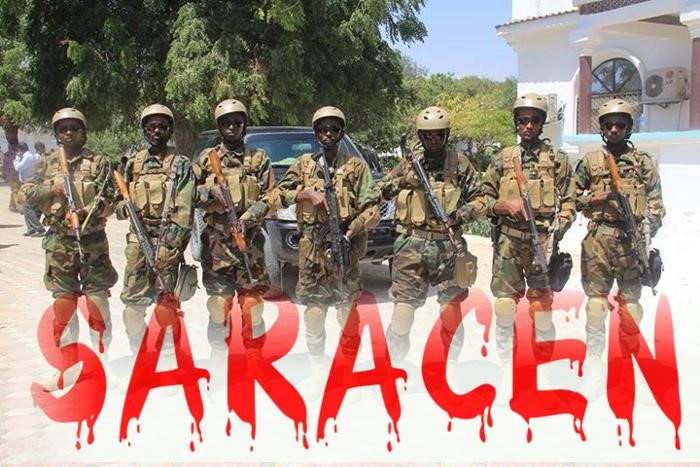
Saracen International militiamen engaged in defense of United Arab Emirates oil interests in Puntland[70]
An influence that has become fatal today as Somalia’s new federal government, founded less than a decade ago[71] and ultimately bringing together all the territories, has decided to remain neutral in all international disputes, which arouses the anger of the Emirates as they attempt to Mogadishu force them to oppose Qatar[72] and even intervene militarily to influence the democratic vote of the Somali people[73].
Back in 2009: The task of training these 1050 men is entrusted to two partners of Saracen International, Michael Shanklin and Pierre Richard Prosper[74]. Shanklin is the former deputy director of the CIA station in Mogadishu who, after retiring in 2011, joined Buckingham and the others in the Saracen constitution and is tasked with preparing Puntland troops for intelligence missions[75], in particular through the intermediary of certain Russian officers, who had been unemployed after leaving the army of the Soviet Union[76].
Prosper is the son of two Haitian political refugees who trained in New York[77], served as military advisers to President George W. Bush[78], and were subsequently appointed prosecutors at Rwanda’s International Court of Justice[79]. There he was chosen by the Kigali government as legal adviser on international political issues[80]. On behalf of the Abu Dhabi government, Prosper acted as a mediator for the release of many Muslims illegally imprisoned in Guantánamo[81].
A few years later, he caused Saracen International[82] to fail: in addition to arming Puntland’s 1,050 mercenaries[83], he also made sure to arm the pirates in accordance with Erik Prince’s infamous Blackwater[84]. United Nations observers revealed that the crews of two Saracen Group ships (Eaton and Seafarer) made regular stops in Djibouti to load weapons that were sold by the local government[85] and for Somali pirates and other rebel military groups in the region. Horn of Africa – an operation the purpose of which was to use UAE money to create the most powerful army in the entire region – an army that could control not only Somalia but the surrounding nations as well [86]. After the discovery, Abu Dhabi and its allies had to stop the formation of the Puntland[87] army. From that point on, pressure from the Gulf States was mediated by Kenya, which frequently sent troops to Somalia to influence the future political and tribal balance of the newly formed Federal Republic[88].
The amazing biographies of Puntland mercenaries
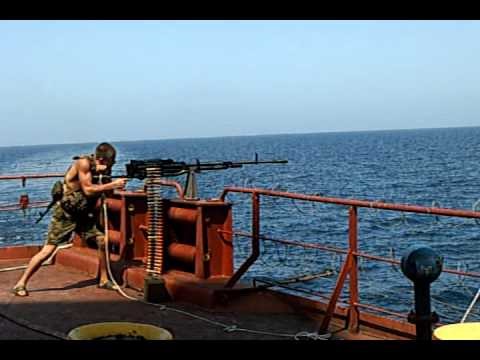
Saracen international mercenary troops prepare for shootout with Somali pirates[89]
The quality of Saracen International’s mercenaries is truly amazing:
- Englishman Craig Andrew Shaw is a retired British naval sergeant who first worked for Triskel (a side company run by Massimo Cauci and Gilles Capelle), then after being caught red-handed supplying arms to the rebel armies[90], did the same for Saracen International[91]. Until 2019, when the company was liquidated[92], Shaw was a director and majority shareholder of Saracen International Ltd. Stockport[93]. Around this company, Shaw has created others with similar activities: a) XTP International Ltd. Stockport[94]; b) Securex UK Ltd. Manchester (founded in October 2001 and liquidated in April 2016[95]; c) Sax Media Ltd. Stockport, founded in January 2013 and liquidated in April 2016[96]; d) Autonomous Vehicles International Ltd. Stockport[97], founded in July 2006 and still active[98].
- His assistant, Ms. Gail Lesley Clough, Shaw’s colleague in UK business administration[99], trained at Kestrel Aerospace Ltd. Stoke on Trent (Kestrel Group – Australia[100]), where she worked on a development project for a single-seater vertical take-off aircraft[101], is now the head of another Shaw company, Amber Business Investments Ltd. Manchester[102].
- Willem Hendrik “Bill” Pelser[103] is the head of Saracen Uganda Ltd. since August 1995 after years of fighting in Angola[104]. Kampala and Saracen International SAL Beirut[105], to which the United Arab Emirates contributes $ 50 million per year[106]. As a former South African special officer, he still heads BRZ International Ltd. Nevis (with main office in Pretoria[107]); for BRZ Uganda Ltd. Kampala fought Pelser in Congo[108] (before Uganda Saracen took control of the contract[109]), Kenya, Tanzania[110] and Sudan[111]; ICV International Collective Ventures Africa SA[112] (with offices in Lubumbashi, Kampala, Lusaka and Johannesburg[113]) controls dozens of companies around the world[114] that were previously part of the Saracen group[115], including E-Talk Ltd. Pretoria[116] and Top SIG SA Lubumbashi[117]. This group of companies, of which the UAE government[118] is its main client, is still active and the courts in half of Africa are now fighting over who is the real owner[119].
- Alexander “Mahuta” Akandwanaho[120] is the one who made the millionaire deals with PAM, Total E&P, NSSF, Stanbic Bank and DFCU Bank, and is the founder of Assured Partners Insurance Brokers Ltd. Kampala[121]. He is the son of General Caleb “Salim Saleh” Akandwanaho, brother and now military adviser to President Yoweri Museveni[122] after trading in arms during the Second Congo War[123]. In 1998 he was involved in the purchase of scrap metal which was returned as a military helicopter (1998) for which he received commissions[124] of $ 800,000. But he was also Craig Shaw’s partner in the aforementioned arms delivery to the Somali rebels[125].
- One of the best Saracen snipers, former South African Army NCO Lodewyk Pietersen, brings weapons for pirates and irregular armies fighting in Somali territory via Uganda, the South Africa and the United Arab Emirates and society – its delegate in Somalia was the French [126]mercenary Richard Rouget[127]. Pietersen was killed in a shootout in South Africa in April 2012 shortly after his mission in Somalia ended[128].
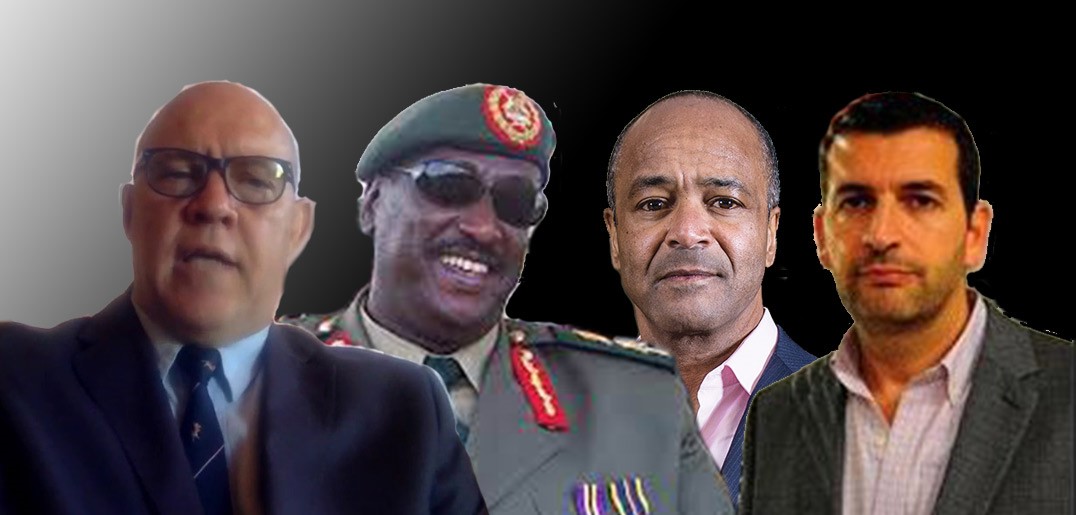
From left: Bill Palser, General Caleb “Salim Saleh” Akandwanaho, Pierre Richard Prosper and Massimo Cauci
- Lafras Luitingh, the military coordinator of Saracen International[129], is a former officer in the Civil Cooperation Bureau[130] who established contacts between Erik Prince and the mercenaries of the Saracen group and the royal family of the United Arab Emirates[131]. With the money he earned from the wars in Africa, Luitingh has now grown into a multi-million dollar logistics company in Australia[132]. An Australian citizen, he is still being sued by the American justice system which seeks to bring him to justice for his activities in Africa over the past 30 years[133], in particular the misdeeds accused of his first company, Executive Outcomes[134]. More recently, Luitingh has been blamed for engaging the savage armed guards of the Canadian mining company Barrick Gold in the massacre of the indigenous peoples of Papua New Guinea[135].
- Massimo Cauci is an Italian with a long history in the French Foreign Legion, many of whom guarded the Mururoa nuclear power plant in Tahiti, before fighting in Chad, Sudan, Djibouti and finally as a coach during the coup which brought Laurent-Désiré Kabila Mobutu dethroned[136]. After this bloody war, Cauci resigned and worked as a bodyguard for the European Union ambassadors in Burundi[137], moved to Brighton and worked as a guard in transporting tanks for Italian and Arab jewelers, then for the oligarchs[138]. Russian. In November 2008, he founded Triskel Services Ltd. London[139] and its holding[140] company Triskel International Ltd. London[141], which has hired many mercenaries from Executive Outcomes and the Blackwater Group[142]. From 2013, Triskel will also open a branch in Rome and a new company in London[143] and start hiring the riflemen of the special unit of the San Marco Brigade – one of NATO’s[144] elite troops – receiving a licensed from Confindustria and replacing Saracen International in Somalia and on ships crossing the Gulf of Aden[145].
- Gilles Capelle is the head of the Djibouti office of the Triskel group and a former paratrooper for the French Navy and then for the secret services (DGSE)[146]. At the same time, he leads an intensive animal defense activity in the Rwandan section of the WCS Wildlife Conservation Society[147] and works with another global security company, Sovereign Global Solutions[148], in the area of pirate defense[149].
- While Saracen International trainers are busy in Puntland, another militiaman, Lebanon Mohammed “Ottavio” Ahmed, owner of Southern Ace Ltd. Hong Kong[150], with his partner Paul Calder Le Roux, to seize power in the Galmudug region and organize another army of 220 mercenaries, paid in the trade of opium, cocaine and dagga (a southern quality of marijuana -African[151]). Le Roux, a former Zimbabwean soldier who emigrated to Australia and then fled for economic reasons (leaving his wife and children in Sydney), is also known by the pseudonyms Bernard John Bowlins and John Smith[152]. Prior to working with Saracen International and Southern Ace, he was in the Philippines, North Korea, Mozambique and South Africa (with gold courier Doron Zvi Shulman), Democratic Republic of Congo, Mali (with a another Saracen man, former US Marine Joe Hunter), and upon his arrival in Somalia, he will take with him his most loyal collaborator, former Belgian army officer Erwin Bockstaele, and a Bulgarian militiaman, Ivan Vaclavic (also known as Maros Deak)[153].
As the mask finally fell
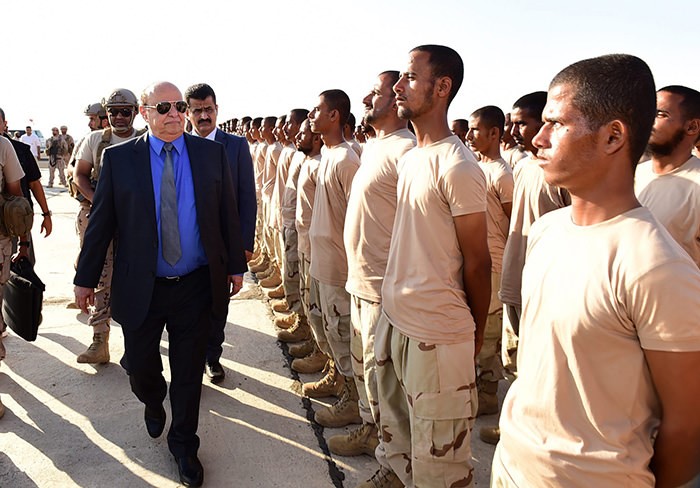
Colombian mercenaries, former militiamen of the drug cartels, were hired by security companies who moved to the United Arab Emirates and were sent to Yemen to fight[154]
The catastrophic end of the engagement in Somalia and the rest of sub-Saharan Africa did not end the activities of the mercenaries who worked for Executive Outcomes, Blackwater, Saracen International or any of the other companies described until present for the past 30 years’ fought. Saracen himself wound up his well-known companies and registered a new umbrella company, SCS Sterling Corporate Services Fze Dubai[155]. With logistics managers from the old days all dead or in prison, the Emirates have also founded their own airline specializing in the transport of weapons and troops, Ska Air & Logistics Fze Dubai[156].
The mask has fallen and now the government of Abu Dhabi no longer needs to hide: its mercenaries, hired by the thousands over the last decade, provide troops to the secret services which suppress the internal political opposition; for acts of war abroad (such as in Yemen); in support of friendly dictatorships (as in Egypt); to prepare the invading forces in case the Emirates and Saudi Arabia decide to turn the current Persian Gulf Cold War into an armed conflict[157].
It is an extremely delicate situation that humanity has not known since the days of medieval monarchies, when lucky soldiers decided the fate of European politics. In the absence of consolidated Nations, the most powerful armies were those of the Duchy, the Lordship and the Principality, capable of paying the best troops and arming them more effectively. As early as 1700, the establishment of popular military service had given the armies of countries with a larger population greater strength.
We have been sent back 500 years, but with highly technological and specialized armies. An extremely dangerous situation: when rich countries invest in the best, the most talented and the most athletic mercenaries, similar rules apply in wartime, but with far more harmful consequences. Of course, neither the Russians nor the Americans can now complain that they invented this game and funded it during the Cold War years. Today, they are the ones who sell the best products, and they gladly do so. But it is obvious to no one that in the recent past even the Germany of Adolf Hitler and the Soviet Union of Josip Stalin had not allowed such a concentration of power in the hands of one person as it is the case today in the country of Mohammed Bin Zayed Al-Nahyan.
[2] https://opencorporates.com/companies?jurisdiction_code=&q=g4s+secure+solutions&utf8=%E2%9C%93
[3] https://www.mic.com/articles/40307/5-of-the-world-s-most-elite-mercenary-armies
[4] https://www.theguardian.com/uk-news/2014/aug/22/immigrants-cheap-labour-detention-centres-g4s-serco
[5] https://www.miamiherald.com/news/state/article168011957.html ; https://www.theguardian.com/society/2015/may/20/misconduct-youth-jail-rainsbrook-ofsted-g4s ; https://www.theguardian.com/society/2016/oct/21/managers-g4s-medway-youth-jail-paid-bonuses-despite-failings
[6] https://www.theguardian.com/uk-news/2016/may/23/g4s-police-control-room-staff-suspended-claims-bogus-999-calls-lincolnshire-force
[7] https://www.nytimes.com/2016/06/15/us/orlando-shooting.html ; https://www.chicagotribune.com/nation-world/ct-orlando-nightclub-shooting-20160614-story.html
[8] https://www.theguardian.com/uk-news/2016/dec/19/g4s-must-pay-for-cost-of-birmingham-prison-riot-says-liz-truss ; https://www.ibtimes.co.uk/rioters-hmp-birmingham-will-face-full-force-law-1597011
[9] Akbarali H. Thobhani, “The Mercenary Menace”, in “Africa Today”, Vol. 23/3, Indiana University Press, Bloomington (Indiana) 1976, pages 61-68, see also in https://www.jstor.org/stable/4185619?seq=1
[10] https://www.youtube.com/watch?v=01I5GdAhBDU
[11] Erwan Bergot, “La Légion au combat : de la Grande guerre à nos jours”, Librairie générale française / Hachette Livre, Paris 1995 ; Anthony Clayton, “Frontiersmen: Warfare In Africa since 1950”, Routledge, London 1998
[12] Anthony Mockler, “The New Mercenaries: The History of the Hired Soldiers from the Congo to Seychelles”, Paragon House Publishers, New York 1987; https://web.archive.org/web/20081224002931/http://www.unhchr.ch/html/menu2/7/b/mercenaries/documents.htm
[13] https://b2bhint.com/en/company/za/executive-outcomes–B1989038663
[14] 1998.05.13 The Independent on Tony Buckingham; https://moneyweek.com/30983/profile-of-tony-buckingham-of-heritage-oil-46336 ; https://www.theguardian.com/business/2011/nov/13/heritage-oil-chief-tony-buckingham
[15] https://web.archive.org/web/20071229125418/http://www.galago.co.za/CAT1_025.htm ; 1993.03.13 The Guardian on Eeben Barlow; Gabriella Pagliani, “Il mestiere della guerra: dai mercenari ai manager della sicurezza”, in “Società e politica”, Vol. 65, Franco Angeli Editore, Milano 2004, pages 57-60
[16] http://www.aloha.net/~stroble/mercs.html ; https://mg.co.za/article/1997-01-24-africas-new-look-dogs-of-war/ ; https://web.archive.org/web/20071229125418/http://www.galago.co.za/CAT1_025.htm ; https://web.archive.org/web/20061008220657/http://www.caat.org.uk/publications/government/mercenaries-1999.php ; Gabriella Pagliani, “Il mestiere della guerra: dai mercenari ai manager della sicurezza”, in “Società e politica”, Vol. 65, Franco Angeli Editore, Milano 2004, pages 57-60
[17] https://link.springer.com/chapter/10.1007/978-1-349-27708-7_11 ; https://www.independent.co.uk/news/mi6-backed-africa-coup-1176189.html
[18] https://opencorporates.com/companies/gb/02112749
[19] https://www.independent.co.uk/news/will-tony-buckingham-be-the-next-tiny-rowland-1169349.html
[20] https://globalarbitrationreview.com/the-chilling-effect-of-jivraj-0 ; https://www.bailii.org/uk/cases/UKSC/2011/40.html
[21] Peter Warren Singer, “Corporate Warriors. The Rise of the Privatized Military Industry“, Cornell University Press, Ithaca/London 2003; https://web.archive.org/web/20030605104458/http://www.policyreview.org/jun03/singer.html
[22] Guy Arnold, “Mercenaries. The Scourge of the Third World“, St. Martin’s Press, New York 1999, page 117; Khareen Pech, “Executive Outcomes – a corporative Conquest “, in: Jakkie Cilliers, Peggy Mason, “Peace, Profit or Plunder?: The Privatisation of Security in War-Torn African Societies“, ISS Institute for Security Studies, Pretoria 1999, pages 83–109
[23] https://www.ogj.com/refining-processing/gas-processing/article/17253143/ranger-oil-ltd-agrees-to-canadian-natural-resources-offer ; https://www.bloomberg.com/profile/company/RGO:US ; https://www.business-humanrights.org/en/companies/ranger-oil-part-of-canadian-natural-resources/ ; https://www.rigzone.com/news/oil_gas/a/1284/ranger_oil_uk_limted_to_be_renamed/ ; https://www.sedar.com/DisplayProfile.do?lang=EN&issuerType=03&issuerNo=00002708
[24] https://www.europarl.europa.eu/RegData/etudes/etudes/join/2011/433768/EXPO-DEVE_ET(2011)433768_EN.pdf, page 29 ; https://www.hrw.org/report/2004/01/12/some-transparency-no-accountability/use-oil-revenue-angola-and-its-impact-human# ; https://www.osti.gov/etdeweb/servlets/purl/20836232, pages 93-97
[25] Peter Warren Singer, “Corporate Warriors. The Rise of the Privatized Military Industry“, Cornell University Press, Ithaca/London 2003, pages 107-109
[26] https://press.armywarcollege.edu/parameters/vol29/iss2/1/ ; https://www.hsdl.org/?abstract&did=484689
[27] https://moneyweek.com/30983/profile-of-tony-buckingham-of-heritage-oil-46336
[28] Peter Warren Singer, “Corporate Warriors. The Rise of the Privatized Military Industry“, Cornell University Press, Ithaca/London 2003, pages 107-109
[29] https://www.independent.co.uk/news/world/the-boys-try-to-do-a-man-s-job-richard-dowden-in-freetown-reports-on-the-young-officers-who-hold-power-in-sierra-leone-1506336.html ; http://www.sierra-leone.org/Archives/slnews0196.html ; https://www.buzzfeednews.com/article/monicamark/what-do-you-do-with-your-life-after-youve-already-been-the-w ; https://www.newstatesman.com/africa/2012/01/sierra-leone-strasser-war
[30] Ibrahim Abdullah, “Bush Path to Destruction: The Origin and Character of the Revolutionary United Front/Sierra Leone”, in “The Journal of Modern African Studies”, Vol. 36/2, Cambridge University Press, Cambridge UK 1998, pages 203-235, see also in https://www.jstor.org/stable/161403?seq=1 ; https://www.jstor.org/stable/43658004?seq=1 ; https://www.cambridge.org/core/journals/journal-of-modern-african-studies/article/abs/bush-path-to-destruction-the-origin-and-character-of-the-revolutionary-united-frontsierra-leone/724532B5CD66697F9E46E8307066C2B3
[31] Steven Brayton, “Outsourcing War: Mercenaries and the Privatization of Peacekeeping”, in “Journal of International Affairs”, Vol. 5/2, Columbia University Press, Hanover (Pennsylvania) 1999, pages 303-329, see also in https://www.jstor.org/stable/24358173?seq=1 ; https://www.newstatesman.com/africa/2012/01/sierra-leone-strasser-war ; https://www.hsdl.org/?abstract&did=484689 ; https://press.armywarcollege.edu/parameters/vol29/iss2/1/
[32] https://moneyweek.com/30983/profile-of-tony-buckingham-of-heritage-oil-46336
[33] https://www.superyachtfan.com/yacht/ngoni/owner/
[34] https://moneyweek.com/30983/profile-of-tony-buckingham-of-heritage-oil-46336
[35] https://opencorporates.com/companies/bs/37177B
[36] https://www.northernminer.com/news/diamondworks-morphs-into-energem/1000156363/
[37] https://books.google.it/books?id=vJ3ivXIW_dsC&pg=PA56&lpg=PA56&dq=Tony+Buckingham&source=bl&ots=fecoeqfYHv&sig=ACfU3U34MVquATugL41F4M-WeWwAfqThNg&hl=it&sa=X&ved=2ahUKEwiu97u7oJzvAhVD3KQKHR-5DoM4KBDoATACegQICxAD#v=onepage&q=Tony%20Buckingham&f=false
[38] https://miningwatch.ca/sites/default/files/appendix_2.pdf, pages 6-7 ; https://www.diamonds.net/News/NewsItem.aspx?ArticleID=3580&ArticleTitle=DiamondWorks+Ltd.%2C+Unveils+Reorganization+Plan
[39] Tim Spicer, “An Unorthodox Soldier“, Mainstream Publishing, London 1999, pages 121-125
[40] http://archive.boston.com/news/world/articles/2004/06/22/security_firms_293m_deal_under_scrutiny/
[41] https://web.archive.org/web/20120519034226/http://www.aegisworld.com/index.php/tim-spicer ; www.aegis.com
[42] 1997.02.24 Sandline International in Papua New Guinea; http://www.hartford-hwp.com/archives/24/157.html
[43] 1997.03.01 Tim Spicer arrested
[44] https://www.yumpu.com/en/document/read/16458861/sandline-scandal-causes-tremors-in-tony-blairs-cool-britannia
[45] Craig Murray, “The Catholic Orangemen of Togo and other Conflicts I Have Known”, Atholl Publishing, London 2009, page 220; https://web.archive.org/web/20050108080600/http://www.thenation.com/docprint.mhtml?i=20050110&s=ackerman
[46] http://news.bbc.co.uk/2/hi/africa/3501632.stm
[47] Ian Smillie, Lansana Gberie, Ralph Hazleton, “The Heart of the Matter: Sierra Leone, Diamonds & Human Security”, PAC Partnership Africa Canada, Ottawa 2000, see also in https://transparencylab.org/Documentation/Advocacy,%20Monitoring,%20Sustainable%20-%20Responsible%20Initiatives/IMPACT_/The%20Heart%20of%20the%20Matter%20Sierra%20Leone,%20Diamonds%20and%20Human%20Security_2000.pdf
[48] https://b2bhint.com/en/company/za/sir-trading-s-a–M1993001951
[49] https://b2bhint.com/en/officer/34121616
[50] https://www.crash.net/a1gp/news/187/1/lola-agrees-deal-for-winter-gp-series
[51] 2001.09.07 DiamondWorks Ltd acquires Otterbea International
[52] https://www.sec.gov/Archives/edgar/vprr/0205/02052003.pdf
[53] https://www.csmonitor.com/World/Global-News/2009/1022/who-is-viktor-bout ; https://web.archive.org/web/20080309180727/http://query.nytimes.com/gst/fullpage.html?res=9C06E0DB1031F934A2575BC0A9659C8B63&scp=1&sq=%22Peter+Landesman%22+bout&st=nyt ; https://web.archive.org/web/20100723020721/http://www.justice.gov/usao/nys/pressreleases/February10/boutviktoretals1indictmentpr.pdf ; https://web.archive.org/web/20120413063146/http://www.justice.gov/usao/nys/pressreleases/April12/boutviktorsentencingpr.pdf ; https://web.archive.org/web/20130823111228/http://www.justice.gov/usao/nys/pressreleases/November11/boutverdictstatement.pdf
[54] https://reliefweb.int/report/angola/angola-south-africa-business-links-unita ; https://www.theguardian.com/world/2000/feb/18/internationalcrime
[55] http://www.minesandcommunities.org/article.php?a=667 ; Alex Vines, “Angola Unravels: The Rise and Fall of the Lusaka Peace Process”, Human Rights Watch, New York 1999, pages 67-69
[56] http://www.sttepi.com/legal.html ; http://www.sttepi.com/about_us.html ; http://www.sttepi.com/default.html ; https://opencorporates.com/companies/gi/96579
[57] https://sofrep.com/news/eeben-barlow-south-african-pmc-devestates-boko-haram-pt1/ ; 2018.11.28 Buhari blamed for Boko Haram killings
[58] https://www.autosport.com/general/news/ambitious-a1-grand-prix-winter-series-project-5018177/5018177/?nrt=111 ; https://www.crash.net/a1gp/news/187/1/lola-agrees-deal-for-winter-gp-series
[59] https://www.ide.go.jp/English/Data/Africa_file/Company/uganda01.html
[60] https://upload.wikimedia.org/wikipedia/commons/d/dc/Icu_somalia_map.png
[61] http://www.lessonsfrompiracy.net/ ; https://eunavfor.eu/
[62] https://web.archive.org/web/20130402205646/http://www.globalgovernance.eu/index.php/p-s-publications/246-new-analysis-the-somali-crisis-and-the-eu-3.html ; https://www.academia.edu/5145475/Quaderni_Asiatici_101_marzo_2013_PIRACY_IN_SOMALIA_A_LONG_TERM_MENACE_OR_A_PHENOMENON_IN_ITS_LAST_THROES
[63] https://web.archive.org/web/20110212105724/http://www.cbsnews.com/8301-503543_162-4949488-503543.html
[64] https://www.tandfonline.com/doi/full/10.1080/23340460.2015.960170 ; https://web.archive.org/web/20110501085654/http://www.nibr.no/uploads/publications/26b0226ad4177819779c2805e91c670d.pdf ; https://allafrica.com/stories/201905090605.html ; https://web.archive.org/web/20120112112115/http://www.difesa.it/SMD/CASD/Istituti_militari/CeMISS/Pubblicazioni/News206/2009-12/Pagine/La_pirateria_nel_golfo_di_Aden_11754.aspx ; https://gulfnews.com/world/mena/somali-president-hails-uae-presidents-humanitarian-efforts-1.864794 https://web.archive.org/web/20130913213239/http://www.maritimesecurity.eu/fileadmin/content/news_events/workingpaper/PiraT_Arbeitspapier_Nr6_2011_Maouche.pdf ;
[65] http://dati.camera.it/ocd/aic.rdf/aic4_10352_16
[66] https://www.theguardian.com/world/2010/dec/02/muslim-nation-funds-security-somalia ; Eli Lake, “Private firm trains Somalis to scuttle pirates; Muslim nation financing effort”, in “The Washington Times” of the 29th of December 2010, see in Saracen International on Nexis, pages 432-434; Michael A. Weinstein, “Puntland’s Break With the TFG and the International Crisis Group’s Draft Report”, in “ Garowe Online” of the 24th of January 2011, see in Saracen International on Nexis, pages 442-445; Jeffrey Gettleman, Erik Mazzetti, Erik Schmitt, “U.S. Relies on Contractors in Somalia Conflict”, in “The New York Times” of the 11th of August 2011, see in Saracen International on Nexis, pages 575-579; Katharine Houreld, “Somali region defies federal government over Saracen deal”, in “The Associated Press” from the 28th of January 2011, see in Saracen International on Nexis, pages 23-24
[67] https://www.enoc.com/annualreview2017/group-legal-entities.html ; https://www.youtube.com/watch?v=fkUJTz14tt8
[68] “Uncertain future for soldiers of fortune in volatile East Africa”, in “Mail & Guardian” of the 7th of June 2013, see in Saracen International on Nexis, pages 198-202; “Muslim nation’ funds private Somali militia: Same country pays ex-CIA man to advise government UN investigates possible violation of arms embargo”, in “The Guardian” of the 3rd of December 2010, see in Saracen International on Nexis, pages 374-375; “Private firm flouts UN embargo in Somalia”, in “The Sunday Independent” of the 26th of February 2012, see in Saracen International on Nexis, pages 427-429; Katharine Houreld, “1000-man militia being trained in North Somalia”, in “Associated Press” of the 1st of December 2010, see in Saracen International on Nexis, pages 56-58
[69] https://web.archive.org/web/20130821223522/http://warlalis.com/2013/04/02/somalia-uae-and-somalia-foreign-ministers-sign-mou-on-bilateral-cooperation/ ; https://archive.is/20130910210217/http://m.allafrica.com/stories/201308270272.html/?maneref=https://www.google.com/
[70] https://voiceofsomalia.net/2014/02/07/somalia-saracen-trained-forces-surround-abdiweli-gaas/
[71] https://allafrica.com/stories/201208220474.html ; https://web.archive.org/web/20150504035658/http://library.fundforpeace.org/fsi14-overview
[72] https://globalriskinsights.com/2019/02/uae-relations-with-somalia/
[73] https://abcnews.go.com/International/wireStory/tensions-rise-somalia-uae-delayed-elections-76028071
[74] http://dati.camera.it/ocd/aic.rdf/aic4_10352_16 ; https://books.google.it/books?id=wA44zi04pkEC&pg=PT503&lpg=PT503&dq=pierre+richard+prosper+saracen&source=bl&ots=mYEjIJEF1Z&sig=ACfU3U3nT1ikRpYsD-wE9kYHHNVcoLlfSw&hl=it&sa=X&ved=2ahUKEwjao7-Qsf7uAhVpo4sKHXGCAD4Q6AEwEnoECAUQAw#v=onepage&q=pierre%20richard%20prosper%20saracen&f=false ; https://www.theguardian.com/world/2010/dec/02/muslim-nation-funds-security-somalia
[75] 2010.12.16 Saracen International
[76] https://www.frontlineclub.com/what_do_six_russians_two/
[77] https://www.arentfox.com/attorneys/pierre-richard-prosper
[78] https://en.wikisource.org/wiki/Declaration_of_Pierre-Richard_Prosper
[79] https://www.arentfox.com/attorneys/pierre-richard-prosper
[80] https://www.arentfox.com/attorneys/pierre-richard-prosper
[81] https://www.theguardian.com/world/2010/dec/02/muslim-nation-funds-security-somalia
[82] https://reliefweb.int/sites/reliefweb.int/files/resources/Full_Report_1869.pdf
[83] https://www.theguardian.com/world/2007/jan/13/alqaida.usa
[84] https://www.glistatigenerali.com/germania_medio-oriente/inferno-yemen-armi-tedesche-per-larabia-al-qaeda-ed-i-mercenari-americani/ ; https://www.glistatigenerali.com/imprese/la-philip-morris-va-alla-guerra-con-suprematisti-populisti-e-sceicchi-arabi/ ; https://www.glistatigenerali.com/america-mondo_medio-oriente/quando-abu-dhabi-sognava-di-manipolare-donald-trump/ ; Mark Mazzetti, Eric Schmitt, “Blackwater founder is linked to South African mercenaries”, in “The International Herald Tribune” of the 22nd January 2011 – see also in Saracen International on Nexis, pages 131-133
[85] https://survie.org/billets-d-afrique/2011/208-decembre-2011/article/djibouti-wikileaks-des-mercenaires
[86] https://horseedmedia.net/2014/03/28/somalia-uae-pledges-continued-support-puntland-marine-forces/
[87] https://survie.org/billets-d-afrique/2011/208-decembre-2011/article/djibouti-wikileaks-des-mercenaires ; https://www.defensenews.com/global/mideast-africa/2018/04/17/uae-stops-training-somalias-military-after-cash-seizure/
[88] https://web.archive.org/web/20120816100759/http://www.kenyahighcomtz.org/?action=event-read-more.html&id=1 ; https://www.theguardian.com/world/2012/sep/28/kenyan-soldiers-capture-kismayo-somalia
[89] https://www.youtube.com/watch?v=YuCXwH0qspk
[90] “Qui a affrété l’Antonov bloqué à Hargeisa?”, in ”La Lettre de l’Ocean indien” of the 18th of December 2019 – see in Saracen International on Nexis, pages 161-162
[91] https://www.linkedin.com/in/craig-shaw/?originalSubdomain=uk ; “Saracen’s troops in Gulf of Aden”, in “Intelligence Online”, 16th of December 2010 – see in Saracen International on Nexis, pages 19-20
[92] https://suite.endole.co.uk/insight/company/03965484-saracen-international-limited
[93] https://www.checkfree.co.uk/Company/03965484/SARACEN-INTERNATIONAL-LIMITED/Company-Details/ ; 2016.04.06 Saracen International Ltd. Stockport
[94] 2016.05.25 XTP International Ltd. Stockport
[95] 2014.01.01 Securex UK Ltd. Manchester
[96] https://suite.endole.co.uk/insight/company/08361128-sax-media-ltd
[97] https://www.autonomousvehicleinternational.com/
[98] https://www.checkfree.co.uk/Company/05883551/AUTONOMOUS-VEHICLES-INTERNATIONAL-LIMITED/Company-Details/
[99] 2011.05.25 XTP International Ltd. Stockport; 2010.04.06 Saracen International Ltd. Stockport
[100] https://opencorporates.com/companies/gb/04914770
[101] https://www.flightglobal.com/vertical-take-off-kestrel-to-start-tethered-tests-/54445.article
[102] 2019.07.31 Amber Business Investments Ltd. Manchester
[103] https://ulii.org/ug/judgment/hc-civil-division-uganda/2020/115
[104] Michela Wrong, “Security service is booming across Africa: Soldiers, policemen are turning to one of the
continent’s most vibrant growth industries”, in “The financial Post” of the 5th of June 1996, see in Saracen International on Nexis, pages 460-461
[105] https://www.linkedin.com/in/craig-shaw/?originalSubdomain=uk ; “Saracen’s troops in Gulf of Aden”, in “Intelligence Online”, 16th of December 2010 – see in Saracen International on Nexis, pages 19-20; “Qui a affrété l’Antonov bloqué à Hargeisa?”, in ”La Lettre de l’Ocean indien” of the 18th of December 2019 – see in Saracen International on Nexis, pages 161-162; https://www.linkedin.com/in/bill-pelser-5999b634/?originalSubdomain=ug
[106] Katharine Houreld, “1000-man militia being trained in North Somalia”, in “Associated Press” of the 1st of December 2010, see in Saracen International on Nexis, pages 56-58; “UAE to reportedly fund secret anti-piracy program in Somalia’s Puntland”, in “BBC Monitoring Africa” of the 11th of July 2012, see in Saracen International on Nexis, pages 535-538
[107] https://brz-international.com/our-team/
[108] “African skies: sous-traitant des firmes de sécurité”, in ”La Lettre de l’Ocean indien” of the 13th of February 2015 – see in Saracen Internationl on Nexis, pages 217-218
[109] David Isenberg, “PMSC not ready for UN prime-time”, in “Political Machine” from the 11th of July 2012 – see in Saracen Internationl on Nexis, pages 293-296
[110] Michela Wrong, “Security service is booming across Africa: Soldiers, policemen are turning to one of the
continent’s most vibrant growth industries”, in “The financial Post” of the 5th of June 1996, see in Saracen International on Nexis, pages 460-461
[111] “SA landmine man captured” in “Cape Argus” of the 30th of April 2012, see in Saracen International on Nexis, pages 455-456
[112] https://icv-africa.com/about/
[113] https://b2bhint.com/en/company/za/international-collective-ventures–M1997004618
[114] https://b2bhint.com/en/officer/33072511
[115] https://www.slideshare.net/vospieter/saracen-profile-2009
[116] https://b2bhint.com/en/company/za/e-talk–K2016066729
[117] https://vymaps.com/CD/TOP-S-I-G-Security-3090/
[118] “Piracy Business is Booming – for pirates, navies and mercenaries”, in “Ground Report” of the 22nd of December 2010, see in Saracen International on Nexis, pages 415-416
[119] https://ulii.org/ug/judgment/hc-civil-division-uganda/2020/115 ; https://cavendish.ac.ug/governance-administration/dean/1 ; https://scholar.google.com/citations?user=PiyW_xsAAAAJ&hl=en
[120] https://www.linkedin.com/in/alexander-akandwanaho-284b486a/?originalSubdomain=ug ; https://twitter.com/a_m_akandwanaho?lang=it
[121] https://saracen.co.ug/about/alexander-akandwanaho/ ; https://opencorporates.com/companies/ug/80010004146685
[122] https://www.matookerepublic.com/2020/02/24/gen-salim-salehs-son-to-contest-for-nrm-vice-chairperson-seat-for-western-region/ ; https://en.wikipedia.org/wiki/Salim_Saleh
[123] http://www.oecd.org/daf/inv/mne/illegalexploitationofnaturalresourcesinthedemocraticrepublicofcongopublicstatementbycime.htm
[124] https://allafrica.com/stories/200605300425.html
[125] https://www.frontlineclub.com/what_do_six_russians_two/
[126] Jeffery Gettleman, Mark Mazzetti, Eric Schmitt, “US security company trains troops for Somalia”, in “Yukon News” of the 12th of August 2011, see in Saracen International on Nexis, pages 580-584
[127] https://opencorporates.com/companies/us_va/05215231
[128] “SA citizens under fire in hot spots; Two have been captured and a local TV reporter escaped a gun attack”, in “Cape Argus” of the 1st of May 2012, see in Saracen International on Nexis, pages 452-454; “South African security officer killed in Somalia”, in “Defence Web” of the 30th of April 2012, see in Saracen International on Nexis, pages 518-519; Abdi Guled, “South African security trainer killed in Somalia”, in “The Associated Press” of the 28th of April 2012, see in Saracen International on Nexis, pages 524-525
[129] Katharine Houreld, “Somali regional government defying federal leaders over contract linked to Blackwater founder”, in “The Canadian Press” of the 28th of January 2011 – see also Saracen International on Nexis, pages 21-22
[130] Stephen Johnson, “Loose cannons”, in “Africa in Fact” of the 1st of February 2015 – see also Saracen International on Nexis, pages 359-362; Jeffrey Gettleman, “Somalia is likely to cut to Mercenaries”, in “The New York Times” of the 24th of January 2011 – see also Saracen International on Nexis, pages 470-471
[131] https://books.google.it/books?id=wA44zi04pkEC&pg=PT503&lpg=PT503&dq=pierre+richard+prosper+saracen&source=bl&ots=mYEjIJEF1Z&sig=ACfU3U3nT1ikRpYsD-wE9kYHHNVcoLlfSw&hl=it&sa=X&ved=2ahUKEwjao7-Qsf7uAhVpo4sKHXGCAD4Q6AEwEnoECAUQAw#v=onepage&q=pierre%20richard%20prosper%20saracen&f=false
[132] https://abr.business.gov.au/AbnHistory/View?id=42119632094 ; https://opencorporates.com/companies/za/2006-038324-07 ; https://www.abc.net.au/news/2012-09-04/australian-accused-of-funding-private-somali-army/4242778
[133] https://www.abc.net.au/news/2012-09-04/australian-accused-of-funding-private-somali-army/4242778
[134] https://www.news24.com/news24/sa-businessman-linked-to-somali-militia-drug-trade-20110827-2 ; Ivor Powell, “Focus on controversial piracy mission after SA man’s death”, in “The Sunday Independent” of the 27th of May 2012 – see in Saracen International on Nexis, page 77-77 ; https://www.abc.net.au/news/2012-09-04/australian-accused-of-funding-private-somali-army/4242778 ; https://web.archive.org/web/20061008220657/http://www.caat.org.uk/publications/government/mercenaries-1999.php
[135] https://www.abc.net.au/news/2012-09-04/australian-accused-of-funding-private-somali-army/4242778 ; https://www.glistatigenerali.com/inquinamento_materie-prime/oro-cianuro-e-sangue-nellinferno-della-barrrick-gold/
[136] https://ilpiccolo.gelocal.it/trieste/cronaca/2011/12/06/news/da-staranzano-a-londra-per-fare-la-guerra-ai-pirati-1.2836069
[137] https://ilpiccolo.gelocal.it/trieste/cronaca/2011/12/06/news/da-staranzano-a-londra-per-fare-la-guerra-ai-pirati-1.2836069
[138] https://ilpiccolo.gelocal.it/trieste/cronaca/2011/12/06/news/da-staranzano-a-londra-per-fare-la-guerra-ai-pirati-1.2836069
[139] 2014.11.25 Triskel Services Ltd. London
[140] 2019.12.30 Triskel International Ltd. London
[141] https://www.triskelinternational.com/ ; https://survie.org/billets-d-afrique/2011/208-decembre-2011/article/djibouti-wikileaks-des-mercenaires ; https://www.linkedin.com/in/maxime-cauci-5974b31a/?originalSubdomain=uk
[142] https://www.yumpu.com/it/document/read/15368781/analisi-triskelservicescom-settimopianoit , page 3
[143] 2018.11.07 T-Risk Ltd. London
[144] https://st.ilsole24ore.com/art/notizie/2013-08-04/mercantili-italiani-arrivano-guardie-184602.shtml?uuid=AbCgsHKI
[145] https://www.snewsonline.com/notizie/vigilanza_h24/in_assiv_la_triskel_ltd_prima_in_italia_autorizzata_alla_vigilanza_antipirateria-1519
[146] https://survie.org/billets-d-afrique/2011/208-decembre-2011/article/djibouti-wikileaks-des-mercenaires
[147] https://www.wcs.org/ ; https://www.linkedin.com/in/gilles-capelle-ab9217145/
[148] http://www.so-global.com/organisation/
[150] Southern Ace Ltd. Hong-Kong ; 2016.04.02 The geek the guns and the trail of bodies
[151] https://www.news24.com/news24/sa-businessman-linked-to-somali-militia-drug-trade-20110827-2
[152] https://www.vice.com/it/article/ney4az/dea-accordo-uomo-pericoloso-mondo
[153] 2016.04.02 The geek the guns and the trail of bodies; https://www.vice.com/it/article/ney4az/dea-accordo-uomo-pericoloso-mondo ; https://nypost.com/2020/06/12/paul-le-roux-sentenced-to-25-years-for-sprawling-criminal-outfit/ ; 2015.10.11 From Guildford to gold bars to a jail cell
[154] https://www.dailysabah.com/mideast/2015/11/26/emirates-secretly-pays-colombian-mercenaries-to-fight-in-yemen
[155] Ivor Powell, “SA-linked military firm loses anti-piracy contract; UN fingers Sterling Corporate Services in Somalia”, in “Cape Argus” of the 29th of September 2012, as in Saracen International on Nexis, pages 457-459; “United Nations Expert Group Says Private Military and Security Companies in Somalia Need Regulation”, in “Targeted News Service” of the 18th of December 2012, as in Saracen International on Nexis, pages 552-553; Ivor Powell, Bianca Capazorio, “UN slams SA private army”, in “The Independent” of the 1st of September 2012, as in Saracen International on Nexis, pages 557-558; “Commentator says International community party to strife in Somalia”, in “BBC Monitoring Africa” of the 26th of July 2012, as in Saracen International on Nexis, pages 27-30; Ivor Powell, “Focus on controversial piracy mission after SA man’s death”, in “The Sunday Independent” of the 27th of May 2012, as in Saracen International on Nexis, pages 75-77
[156] “Dubai logistics company to run Mogadishu airport”, in “France Press” of the 28th of December 2010, as in Saracen International On Nexis, pages 137-140, pages 322-323; “Somali MPs says foreign firms operating in the country illegally”, in “BBC Monitoring Africa” of the 30th of December 2010, as in Saracen International on Nexis, page 508
[157] https://www.youtube.com/watch?v=SSqAAZw-Ujk ; https://www.youtube.com/watch?v=GWjzqR41AM0 ; https://www.nytimes.com/2015/11/26/world/middleeast/emirates-secretly-sends-colombian-mercenaries-to-fight-in-yemen.html ; https://insidearabia.com/uae-lures-foreign-mercenaries-to-fight-proxy-wars/ ; https://www.middleeastmonitor.com/20200919-rights-groups-uae-hired-450-mercenaries-to-carry-out-assassinations-in-yemen/ ; https://www.aa.com.tr/en/middle-east/uae-based-black-shield-recruits-mercenaries-in-region/1914366 ; https://research.sharqforum.org/2020/03/16/how-uae-mercenaries-serve-its-foreign-policy-ambitions/ ; https://www.trtworld.com/opinion/the-uae-s-alarming-reliance-on-mercenaries-40028
Leave a Reply